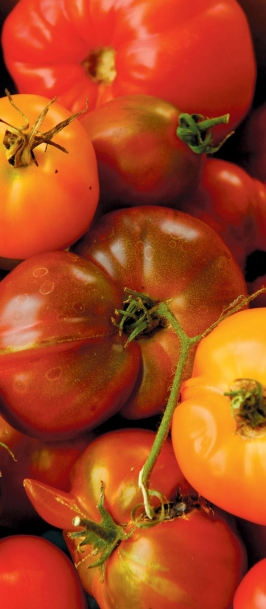How Does Your Garden Grow?
The transition from late summer to fall is generally the busiest, and most bountiful, phase in the annual cycle of your edible garden. Tomatoes are ripening often faster than you can eat them, green beans are dangling from plants nearly collapsing under their weight, and other garden favorites, including cucumbers and summer squash, are, almost magically, ripening overnight.
In between harvesting, eating what you can and preserving the rest, it’s also time to sow the seeds for fall and winter harvests. How do you manage it all without exhausting yourself to the point of swearing off gardening entirely? Here are some of the chores on my list that help make this season less stressful, and more deliciously rewarding.
PREPARE AND PRESERVE
When tomatoes, cucumbers, summer squash, beans and basil are all maturing at a rate that seems overwhelming, get creative with your menu planning, as well as with methods of preserving the bounty to enjoy it all year long. Fresh tomato basil soup can be savored now, and also frozen to warm up cold winter nights. Turn summer squash into fritters or salads—the Summer Squash Agrodolce recipe in this story is a favorite at our house. Make big batches of basil pesto, which freezes extremely well and can be quickly thawed, delivering a taste of summer sunshine in the February chill. Turn ripe tomatoes into sauce to be canned or frozen, or simply freeze them as is to be turned into sauce later. My favorite way to deal with an overabundance of green beans is to pickle them with garlic cloves, hot peppers and dill blossoms or dill seed.
PARE DOWN TO BUILD UP YOUR COMPOST
If you really don’t want to eat any more zucchini, don’t feel guilty about pulling those plants and adding them to your compost pile (or green waste bin). It can be hard to remove still-producing plants, but the reality is that you must make room to plant fall and winter crops, and if you wait until summer crops stop producing completely, cooling weather and fewer hours of sunlight will mean a delayed harvest of delicious winter greens, root vegetables, peas, fava beans, Brassicas (including broccoli, cabbage and bok choi) and Alliums (like onions, leeks and garlic). Ease into it by starting with any summer vegetables that are turning brown or yellowing— it will hurt a little less.
PREP FOR NEW PLANTING
Most summer vegetables are known as heavy feeders, meaning they extract a lot of nutrients from the soil. Those nutrients need to be replenished before putting in new crops. I recommend adding a thin layer of compost over the top of your soil, just enough so that you can’t see the ground below the compost. Then, add a light sprinkling of kelp meal (about a half a pound for 50 square feet). Use a digging fork to turn the kelp and compost into the top four inches of the soil.
If you’ve never had your soil tested for macro- and micro-nutrients, fall is a great time to do so. A lab analysis can tell you precisely what the current nutrient levels are, and what should be added or adjusted in order to increase productivity. A&L Laboratories is my go-to for soil tests. (Al-labs-west.com/services.php?section=Soil%20Analysis)
PLANT FOR FALL AND WINTER HARVESTS
In many ways, I enjoy fall and winter gardening more than summer gardening because the pace of growth is slower, rain helps irrigate the crops, lessening the water bill, and greens and root vegetables are often sweeter due to the cooler temperatures.
My favorite crops for the cooler seasons are kale, chard, collards, bok choi, lettuces, spinach, arugula, carrots, beets, Japanese turnips, radishes, broccoli, cabbage, sugar snap peas, fava beans, onions, garlic and edible flowers.
Ideally, you should have winter greens, Brassicas and root vegetables planted before September 15. If you can make that happen, you can plant a second round around a month later. If you have the space, these staggered plantings ensure that you will be able to harvest well into spring.





